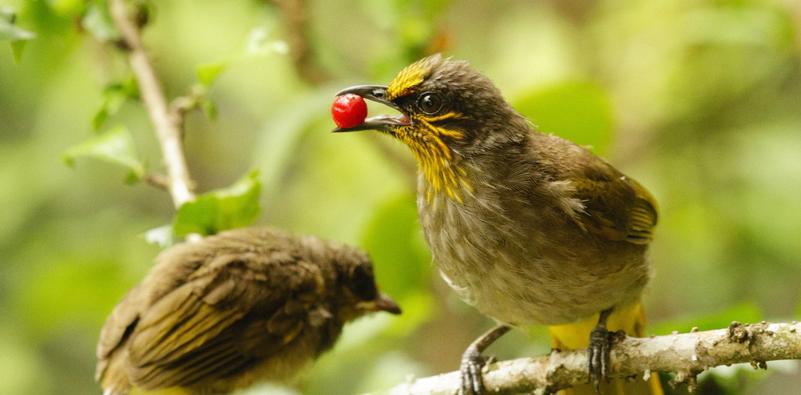Natural Bird Feeders
Native trees and shrubs that feed songbirds
Planting bird-friendly natives will attract fun-to-watch songbirds while making your yard beautiful and easy to care for.
Planting native trees and shrubs that produce berries, fruit, and seed is a natural way to feed the birds. Native plants co-evolved with native birds and the insects that help nourish them. Many of our favorite birds including bluebirds, orioles, grosbeaks, and woodpeckers feed on protein-rich moths, caterpillars, and insect larvae. Oaks, hackberry, chokeberry, and sumac are a few good choices to support insects that birds rely on for nourishment.
Native plants also provide cover and nesting sites for birds. Arborvitae, juniper, viburnum, and oaks encourage songbirds to make themselves at home on your property. Add a water source like a birdbath or fountain, and you can watch birds easily as they bathe and splash.
Remember, planting trees and shrubs that provide food at different times of the season attracts a diverse array of birds over a long period. Here are just a few suggestions to get started.
Serviceberry - birds relish the blue-black fruit that matures in June Amelanchier arborea Snow Cloud, Amelanchier laevis and Amelanciier grandiflora Autumn Brilliance
Chokeberry - birds eat the astringent red berries when other food is depleted Aronia arbutifolia Brilliantissima and Aronia melanocarpa Low Scape Mound®
American Purple Beautyberry - purple berry clusters are a food source for many songbirds Callicarpa americana Atropurpurea
Sweetshrub - dense stems provide cover and nesting sites for birds Calycanthus floridus
Hackberry - berries feed songbirds and the tree provides cover and nesting sites for birds. Celtis occidentalis
Fringetree - birds relish the fruit and trees provide cover and nesting sites for birds Chionanthus virginicus
Dogwood - wintering birds love the red berries Cornus florida Cherokee Brave, Cornus florida Cherokee Princess, Cornus florida Rubra
Hawthorn - berries and nesting sites for birds Crataegus phaenopyrum, Crataegus viridis
Holly - loads of beautiful berries in winter Ilex glabra Gem Box, Ilex glabra Shamrock, Ilex opaca Dan Fenton, Ilex opaca Red Velvet, Ilex opaca Tinga, Ilex verticillata Winter Red, Ilex vomitora Shadow's Female, Ilex x attenuata Savannah
Spicebush - birds eat the red fruit during fall migration Lindera benzoin
Southern Waxmyrtle - the aromatic fruits are eaten by birds in fall and winter Myrica cerifera
Northern Bayberry - the aromatic fruits are eaten by birds and thickets provide nesting sites and cover Myrica pensylvanica
American Hophornbeam - nutlets are eaten by songbirds, wild turkey, and quail Ostrya virginiana
Oaks - provide acorns for woodpeckers, wild turkey, and other birds as well as nesting sites and cover
Fragrant Sumac - Turkey, ruffled grouse, robins, and flickers feed on the red berries in fall and winter Rhus aromatic Grow Low
Viburnum - provides fruit for birds and food for caterpillars V. dentatum Christom, V. nudum Winterthur
Native Trees and Shrubs are a Natural Win!
Our selection of native trees and shrubs thrive in our Mid-Atlantic climate while providing natural benefits for songbirds and other wildlife.
See all our Natives

